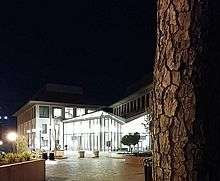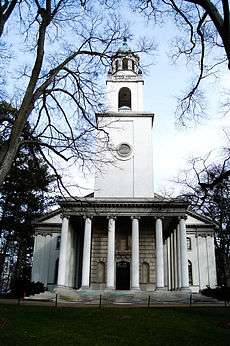Candler School of Theology
 | |
| Type | Private seminary |
|---|---|
| Established | 1914 |
Parent institution | Emory University |
| Affiliation | United Methodist Church |
| Location |
Atlanta, Georgia, United States 33°47′23.1″N 84°19′12.75″W / 33.789750°N 84.3202083°WCoordinates: 33°47′23.1″N 84°19′12.75″W / 33.789750°N 84.3202083°W |
| Campus | Suburban |
| Website |
candler |
Candler School of Theology at Emory University is located in the metropolitan Atlanta area in western unincorporated DeKalb County, Georgia, United States. Candler School of Theology is one of thirteen seminaries affiliated with the United Methodist Church. Founded in 1914, the school was named after Warren Akin Candler, a former president and chancellor of Emory University and a bishop of the Methodist Episcopal Church, South. Currently more than 500 students from over 50 denominations attend Candler School of Theology. Candler houses the World Methodist Evangelism Institute, which is a joint project with the World Methodist Council. Candler has been accredited by the Association of Theological Schools in the United States and Canada (ATS) since 1938.
History
- 1914 – When the Methodist Episcopal Church, South, decided to found a university east of the Mississippi River, Atlanta offered the church $500,000 and the use of Wesley Memorial Church and Wesley Memorial Hospital. As deliberations to choose the site were under way, Asa Candler (owner at the time of Coca-Cola) donated $1 million to make the transformation of Emory College into Emory University possible in 1915. He was a long-time member of Emory's Board of Trustees; his brother Warren A. Candler was a president of Emory College and the first chancellor of Emory University. (Letters from 1914–1915 in the Warren Candler Papers include many suggestions for names for the new university. Included among them, ironically, was "Coke" – honoring the Methodist minister Thomas Coke.) At the meeting where the letter was read Atlanta was chosen as the location, and Bishop Warren A. Candler was named chancellor. The School of Theology opened at Wesley Memorial Church in September. In February 1915 it was named the Candler School of Theology in honor of Bishop Candler.
- 1916 – In September the Lamar College of Law, named for alumnus L.Q.C. Lamar, was established. The law college and the Candler School of Theology moved into the first two academic buildings completed on the Druid Hills campus.
- 1919 – The Coca-Cola Company was sold in 1919 to a group of investors led by Atlanta businessman Ernest Woodruff, whose son, Robert Winship Woodruff, as president and chairman, guided the company for three decades (1923–55). In 1979 Robert Woodruff and his brother George made a gift of approximately $105 million which, at the time, was the largest single gift to a single educational institution in the nation's history.
- 1922 – In 1922, as Warren Candler was relinquishing administrative control of the University, the theology school decided to allow the registration of women to prepare them for Christian service in home and foreign mission fields.
- 1965 – The God is Dead Controversy—As the Sesquicentennial issue of Emory Magazine reported the story, it goes like this:
- On October 22, 1965, while the Emory Board of Trustees met to approve the announcement of a $25 million fund drive, readers across the country were discovering far more surprising news about the University in Time Magazine's religion section: a handful of young theologians calling themselves Christian atheists claimed God was dead, and their leader was Thomas J. J. Altizer, an associate professor of Bible and religion at Emory.... The resultant controversy catapulted both Emory and Altizer into the news. Altizer's name became a household word: for many it was synonymous with God-killer. Emory, the conservative, Southern, Methodist university that employed him, was the unlikely scene of the crime. President Sanford Atwood stood by Altizer during the fracas. At the same time, Board Chair Henry Bowden stood behind Atwood with the confidence that any president needs in a board chair at such times, though Altizer's scholarly conclusions were views that Bowden disagreed with. William Cannon, then dean of the Candler School of Theology and later a bishop of the United Methodist Church, went on record in the Atlanta newspapers defending academic freedom—though also quietly pointing out that Altizer was a member of the college faculty, not the theology faculty, and, as a lay member of the Episcopal Church, was not subject to clerical discipline. But the statement of principles that governed the university's relationships with the faculty held firm against a strong tide of public opinion battering the wall of the "radical" university.
- 1975 – The purchase of the Hartford Collection of theological books and manuscripts in 1975 doubled the size of the library's holdings.
- 1979 – Designed by New York architect Paul Rudolph (whose father Keener Rudolph was a member of Candler's first graduating class in 1915), Cannon Chapel broke ground in August 1979—President Jimmy Carter spoke at the ceremony—and was officially consecrated in September 1981. Since then the chapel has hosted some seminal events in Emory history, including President Bill Clinton’s economic summit in 1995, the Dalai Lama’s launching of the Emory/Drepung Loseling affiliation in Tibetan studies (also in 1995), and Archbishop Desmond Tutu’s meeting and dialogue with Rajmohan Gandhi, to name a few. It also has become, under the guidance of Marcy Assistant Dean of Worship Barbara Day Miller, a central space of worship and faith for everyone in the university community. (from Emory Report September 17, 2001)
- 2001 – Cannon Chapel celebrates its 20th birthday the week of September 11, even in the wake of the national tragedy that holds Emory, along with the rest of the country, in a grip of sadness. But, according to Candler School of Theology Dean Russell Richey, the horror that was September 11, 2001, and its aftermath afforded Emory the opportunity to learn just how crucial a space Cannon has become.
- "In this academic year, we celebrate the 20th anniversary of Cannon Chapel; we celebrate its centrality in the life of Candler; we celebrate its elasticity; we celebrate its place in Emory worship; we celebrate its capacity to accommodate the arts," Richey said. "All those aspects or dimensions of its utility came into expression" [Sept. 11]. "The Candler community faculty, staff, students followed the tragic events of the day together in Brooks Commons," Richey continued. "At 11 a.m., we convened for worship. In word, sacrament and music, we found solace. Before and after the service, individuals resorted to the sanctuary and side chapel for prayer. After the 5 p.m. Glenn service, Emory students resorted to Brooks for quiet conversation and refreshments. On occasions of such sorrow but also on more joyous occasions, Cannon Chapel has a central place in Candler's life and in Emory's." (from Emory Report September 17, 2001)
- 2007 – Jan Love is named the first woman dean of the Candler School of Theology. Ground was broken on Candler's new building project which will conclude with the razing of Bishops Hall and abdication of the historic Pitts quad building to Emory College.
- 2008 – The first phase of the theology building project was completed. The new five-story building opened for classes and Bishops Hall, the old theology building, was sealed in preparation for demolition.
Degree programs
Candler offers four-degree programs and seven certificate programs:
Masters level
- Master of Divinity (MDiv)
- Master of Theological Studies (MTS)
- Master of Theology (ThM), a second-tier masters earned after the MDiv
- Master of Religious Leadership (MRL)
- Master of Religion and Public Life (MRPL)
Candler offers dual degree programs in Bioethics, Business, Development Practice, Law, Public Health, and Social Work (UGA).
Doctoral level
- Doctor of Theology in Pastoral Counseling (ThD)
- Doctor of Ministry (DMin)
Certificate programs
Certificates are awarded along with master's degrees and cannot be earned separately
- Anglican Studies
- Baptist Studies
- Black Church Studies
- Church and Community Ministries
- Faith and Health
- Religious Education
- Women in Faith and Ministry
- Human Rights
Deans
Nine people have held the deanship at the Candler School of Theology:
- Plato T. Durham (1914–1919)
- Franklin Nutting Parker (1919–1937)
- Henry Burton Trimble (1937–1953)
- William Ragsdale Cannon (1953–1968) later Bishop Cannon
- James T. Laney (1969–1977), later President of Emory University and U.S. Ambassador to South Korea
- James Waits (1978–1991)
- R. Kevin LaGree (1991–1999)
- Russell E. Richey (2000–2006)
- Jan Love (2007 – ) News Release
Notable faculty
- Bishop Frank Kellogg Allan (in retirement)
- Roberta Bondi, retired
- William Ragsdale Cannon – Dean of the Seminary (1953–1968)
- John B. Cobb (until 1958)
- Fred Craddock
- Brian Davies OP – visiting professor
- James W. Fowler-retired
- Luke Timothy Johnson
- Thomas G. Long
- Jürgen Moltmann – visiting professor (1983–1993)
- David L. Petersen
- Don Saliers – retired
- Bishop Bennett Jones Sims – visiting professorship (1980–88)
- Andrew Sledd – professor of Greek at Emory College (1899–1902); first president of the University of Florida (1905–1909); president of Southern University (1910–1914); first Candler professor of New Testament Literature (1914–1939)
- Desmond Tutu – 1984 Nobel Laureate and Anglican archbishop, past visiting professor of theology
- Bishop Woodie W. White – Bishop-in-Residence
- Bishop Charlene Kammerer – Bishop-in-Residence
- Justo L. González, professor for eight years, retired
Notable alumni
- Arthur James Armstrong – former Methodist bishop
- Robert McGrady Blackburn (Bachelor of Divinity, 1943) – bishop of the United Methodist Church
- Richard E. Blanchard, Sr. (B.D., 1949) – Methodist pastor and writer of the Gospel song "Fill My Cup Lord."
- D.L. Dykes, Jr. (B.D., 1942) - Methodist pastor and theologian
- Robert Eugene Fannin (M.Div. and S.T.D.) – Bishop of the United Methodist Church
- John E. Fellers (1935–2007) – executive director for the Institute of Religion and Health at Texas Medical Center in Houston; opponent of the Religious Right
- Larry M. Goodpaster (M.Div., 1973, D.Min. 1982 – Bishop of the United Methodist Church. Elected President of Council of Bishops in 2010.
- Paul Hardin, Jr. (Divinity degree, 1927) – Bishop of The Methodist Church
- John William Harkins (Anglican Studies Program) - Senior Lecturer of Pastoral Theology and Care at Columbia Theological Seminary, Episcopalian Priest
- Earl Gladstone Hunt, Jr. – Bishop of The Methodist Church and the United Methodist Church, previously President of Emory and Henry College
- Lewis Bevel Jones III (BA 1946, M.Div 1949, D.D. 1997) – a Bishop of the United Methodist Church, Bishop in Residence of Candler School of Theology
- Bernice Albertine King (M.Div., 1988) – daughter of famed African-American civil rights leader, Dr. Martin Luther King, Jr. and Coretta Scott King, now a minister at the 25,000-member New Birth Missionary Baptist Church in Lithonia, Georgia.
- Clay Foster Lee Jr (BD, 1953) – a Bishop of the United Methodist Church
- Michael E. Lodahl – Professor of Theology and Philosophy of Religion at Point Loma Nazarene University
- Richard Carl Looney – a Bishop of the United Methodist Church
- Doug Moseley – retired Methodist minister and former member of the Kentucky State Senate
- Carl Julian Sanders (B.D., 1936) – a United Methodist Bishop
- Kiyoshi Tanimoto
- Timothy W. Whitaker (M.Div., summa cum laude, 1973) – Bishop of the United Methodist Church
- Donald Wildmon (M.Div.) – author, former radio host, and founder and chairman of the American Family Association.
Photo gallery
-

Bishops Hall
-

Pitts Theology Library
-

Cannon Chapel
External links
- Official website
- World Methodist Evangelism Institute
- Emory University
- United Methodist Church General Board of Higher Education and Ministry
